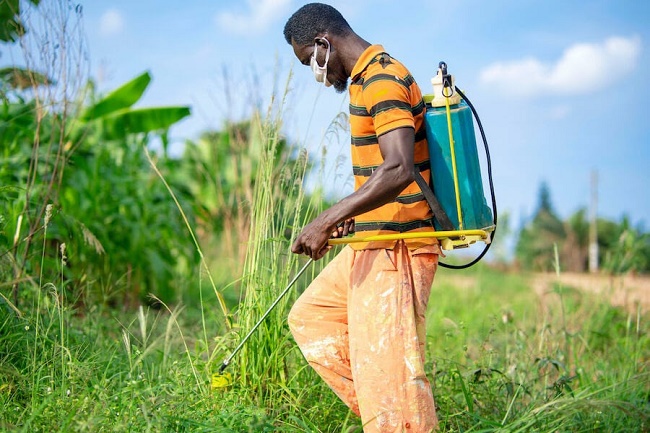The Children’s Environmental Health Foundation (CEHF) is sounding the alarm on the widespread use of highly hazardous pesticides (HHPs) among Zambia’s smallholder farmers – calling it a public health and environmental crisis that demands urgent government intervention.

According to recent field data and expert testimony, over 95 percent of small-scale farmers in Zambia are applying hazardous chemicals such as those used against Spodoptera frugiperda (fall armyworm) in maize and Tuta absoluta (tomato leaf miner) in tomato crops.
These pests – already resistant to many chemical treatments – are prompting farmers to increase pesticide dosages dangerously, often without adequate training, protective gear, or understanding of the long-term consequences.
A Triple Threat: Health, Environment, and Food Security
Speaking during a media briefing, CEHF Executive Director, Michael Musenga, warned that this unchecked pesticide use poses a triple threat to Zambia’s future.
“Our food systems, our health systems, and our ecosystems are all under siege because of unregulated pesticide use. Pregnant mothers and children in farming households are exposed daily to toxic residues in the air, water, and food. Meanwhile, the soil is being degraded, water sources polluted, and beneficial insects like bees and butterflies wiped out,” Mr. Musenga said.
Numerous studies have linked long-term pesticide exposure to neurodevelopmental delays, respiratory diseases, hormonal disorders, cancer, and birth defects, particularly in children and youth. In rural areas, where children often help with farm work or live near sprayed fields, the risk of unintentional exposure is dangerously high.
Gaps in Law and Practice
Zambia is a signatory to several international conventions, including the Rotterdam and Stockholm Conventions, which aim to regulate hazardous chemicals. However, enforcement gaps remain.
“Despite being signatories to global agreements, we still allow highly hazardous pesticides to circulate freely in informal markets. Smallholder farmers buy them over the counter with little regulation, and many are unaware they are applying chemicals banned in other countries,” Mr. Musenga said.
CEHF also noted that Zambia’s extension services are severely overstretched, with one officer often covering over 1,500 farmers, making it nearly impossible to monitor pesticide use or deliver timely advice on sustainable alternatives.
What CEHF Is Demanding
CEHF is calling on the Government of Zambia, in collaboration with development partners, the private sector, and academia, to undertake comprehensive reforms that prioritise child safety, farmer health, and environmental protection:
1. Enforce the Ban on Highly Hazardous Pesticides (HHPs)
Fast-track the review and banning of pesticide products identified as Class Ia and Ib by the World Health Organisation (WHO).
Strengthen regulation and customs controls to stop the illegal importation and sale of banned products.
2. Launch a National Awareness Campaign
Educate farmers, agro-dealers, and the public on pesticide safety, resistance management, and the dangers of overuse.
Target messages to protect vulnerable populations including children and women of childbearing age.
3. Expand Access to Sustainable Alternatives
Promote Integrated Pest Management (IPM) techniques and biological pest control (such as parasitoids and natural predators).
Provide subsidies or incentives for eco-friendly farming inputs such as organic biopesticides and protective equipment.
4. Strengthen Agricultural Extension and Digital Tools
Invest in community-based extension models and expand the use of digital advisory platforms like Plantwise Plus to disseminate timely, localised pest control information.
Train extension officers in toxicology, child health, and environmental monitoring.
5. Establish a National Pesticide Surveillance System
Set up systems to track pesticide use, exposure levels, and associated health outcomes.
Monitor pesticide residues in food crops, water sources, and rural households, especially near schools and homes.
Protecting Children Is Non-Negotiable
CEHF believes that no economic gain from higher crop yields should come at the cost of child health and environmental degradation.
Mr. Musenga stressed the urgency of integrating environmental health into all national agricultural strategies.
“Zambia’s ambition for agricultural transformation and food security must go hand in hand with a vision for safe, sustainable, and inclusive farming. No child should grow up in a toxic environment where their food, water, and air are contaminated by chemicals that were banned elsewhere decades ago.”
“If we fail to act now, we will not only endanger our farmers and their families—we will compromise the very future of agriculture in Zambia,” he added.
